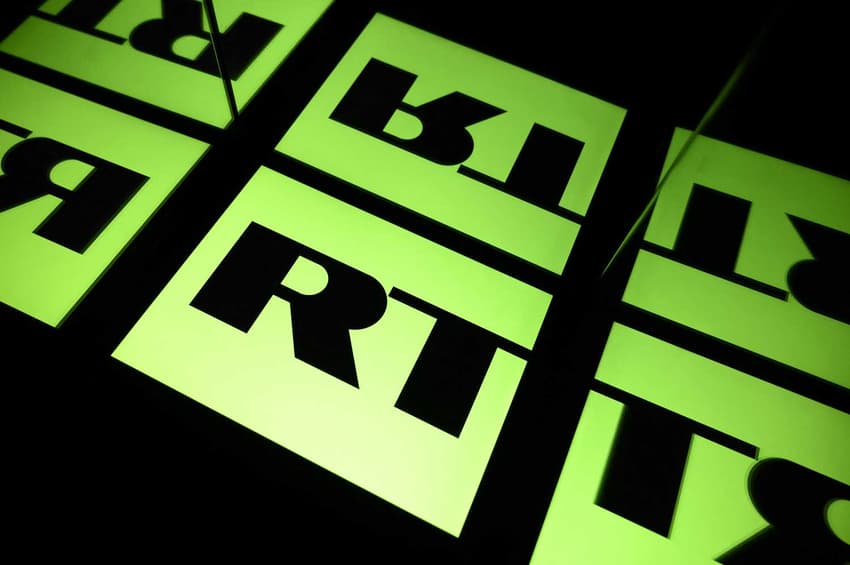EXPLAINED: Why Switzerland has not banned Russia’s propaganda networks

Unlike many other countries, Switzerland has not banned Russian propaganda networks like Russia Today (RT) and Sputnik. Why?
In the days after Russia’s invasion of Ukraine, authorities in the European Union, the United States, Australia, the United Kingdom and elsewhere banned Russian state-run news networks, including Russia Today and Sputnik.
In making the announcement, the EU said it would stay in place “until the Russian Federation and its associated outlets cease to conduct disinformation and information manipulation actions against the EU and its member states.”
As of late May however, Switzerland has not followed suit - although several networks including Salt, Sunrise and Swisscom have voluntarily removed the channels from their networks.
Speaking at the World Economic Forum in Davos in late May, former Ukrainian boxer Vladimir Klitschko, whose brother is mayor of Kyiv, said Switzerland would have "blood on its hands" if the networks were not banned.
Klitschko said the networks were "brainwashing" people in Switzerland about the conflict.
UPDATE: How Switzerland could be impacted by the Russian invasion of Ukraine
Why hasn't Switzerland banned the networks?
Swiss federal councillor Viola Amherd, the head of the Department of Defence, Civil Protection and Sport (DDPS), announced a plan to ban the channels on March 23, calling them a Russian “propaganda hub”.
“After consistent adoption of EU sanctions by Switzerland, standing aside on this important issue would be incomprehensible” a department spokesperson told Swiss news organisation Tamedia.
Legal experts however question whether Switzerland would be able to uphold such a ban.
A Federal Office of Communications (Ofcom) spokesperson told 20 Minutes that the government has ‘no legal basis’ to enforce such a ban.
"The federal government does not have the basis in telecommunications law to demand blocking of access to websites with content from RT or Sputnik, but I have noted that individual Providers such as Swisscom, Sunrise and Salt no longer offer the relevant programs on their TV platforms,” the spokesperson said.
There is also disagreement on the federal council, Switzerland’s primary governing body, as to whether a ban is justified.
Guy Parmelin, Amherd’s colleague on the seven-member body, said a ban would be disproportionate with freedoms of expression and the media.
Sanctions on Russia: Is Switzerland still a neutral nation?
Parmelin’s Swiss People’s Party have also been the primary opponent of Switzerland’s decision to adopt European Union sanctions against Russia, saying it is an erosion of Switzerland’s long-held neutrality.
The DDPS hit back however, saying the networks were not examples of a free and diverse media, but were instead state-run instruments controlled and financed directly by Moscow.
The DDPS has indicated it will push ahead with a ban, which may lead to a legal showdown to determine the legality of the prohibition.
Ukraine: Pressure builds on Switzerland to deport ‘Putin’s mistress’
Comments
See Also
In the days after Russia’s invasion of Ukraine, authorities in the European Union, the United States, Australia, the United Kingdom and elsewhere banned Russian state-run news networks, including Russia Today and Sputnik.
In making the announcement, the EU said it would stay in place “until the Russian Federation and its associated outlets cease to conduct disinformation and information manipulation actions against the EU and its member states.”
As of late May however, Switzerland has not followed suit - although several networks including Salt, Sunrise and Swisscom have voluntarily removed the channels from their networks.
Speaking at the World Economic Forum in Davos in late May, former Ukrainian boxer Vladimir Klitschko, whose brother is mayor of Kyiv, said Switzerland would have "blood on its hands" if the networks were not banned.
Klitschko said the networks were "brainwashing" people in Switzerland about the conflict.
UPDATE: How Switzerland could be impacted by the Russian invasion of Ukraine
Why hasn't Switzerland banned the networks?
Swiss federal councillor Viola Amherd, the head of the Department of Defence, Civil Protection and Sport (DDPS), announced a plan to ban the channels on March 23, calling them a Russian “propaganda hub”.
“After consistent adoption of EU sanctions by Switzerland, standing aside on this important issue would be incomprehensible” a department spokesperson told Swiss news organisation Tamedia.
Legal experts however question whether Switzerland would be able to uphold such a ban.
A Federal Office of Communications (Ofcom) spokesperson told 20 Minutes that the government has ‘no legal basis’ to enforce such a ban.
"The federal government does not have the basis in telecommunications law to demand blocking of access to websites with content from RT or Sputnik, but I have noted that individual Providers such as Swisscom, Sunrise and Salt no longer offer the relevant programs on their TV platforms,” the spokesperson said.
There is also disagreement on the federal council, Switzerland’s primary governing body, as to whether a ban is justified.
Guy Parmelin, Amherd’s colleague on the seven-member body, said a ban would be disproportionate with freedoms of expression and the media.
Sanctions on Russia: Is Switzerland still a neutral nation?
Parmelin’s Swiss People’s Party have also been the primary opponent of Switzerland’s decision to adopt European Union sanctions against Russia, saying it is an erosion of Switzerland’s long-held neutrality.
The DDPS hit back however, saying the networks were not examples of a free and diverse media, but were instead state-run instruments controlled and financed directly by Moscow.
The DDPS has indicated it will push ahead with a ban, which may lead to a legal showdown to determine the legality of the prohibition.
Ukraine: Pressure builds on Switzerland to deport ‘Putin’s mistress’
Join the conversation in our comments section below. Share your own views and experience and if you have a question or suggestion for our journalists then email us at [email protected].
Please keep comments civil, constructive and on topic – and make sure to read our terms of use before getting involved.
Please log in here to leave a comment.